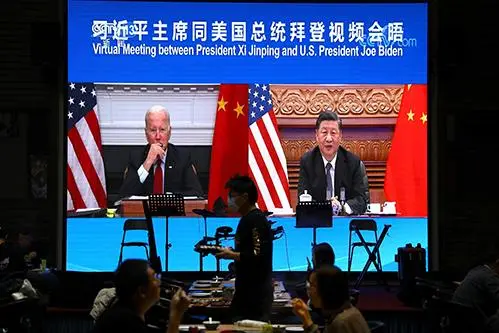PHOTO
A half-century after then-US President Richard Nixon’s February 1972 trip to China, bilateral relations have today reached what could be the biggest tipping point since that landmark moment.
Nixon’s visit was a signature strategic and diplomatic overture that marked the highlight of his administration’s resumption of harmonious relations with China after years of diplomatic isolation following the assumption of power by communists. The normalization of ties culminated in 1979, when Washington established full diplomatic relations with Beijing.
Five decades on, bilateral relations have, since the Trump presidency, been at their lowest ebb for decades. For all of Joe Biden’s indications that he would dial down some of Donald Trump’s overt hostility to China, the current president has yet to reverse any of his predecessor’s policies. Indeed, he has doubled down on many of them, including with the diplomatic boycott of this month’s Beijing Winter Olympics in response to alleged human rights abuses in Xinjiang.
The perceived threat from China was highlighted on Tuesday, when FBI Director Christopher Wray said the nation is “more brazen, more damaging than ever before.” He accused Beijing of stealing “staggering” volumes of information, causing job-destroying damage across a wide range of industries.
Wray added that the FBI opens a new case on Chinese hacking operations every 12 hours or so, arguing that such activity “has reached a new level.” He said: “It’s vital — vital — that all of us focus on that threat together… there’s just no country that presents a broader threat to our ideas, innovation and economic security.”
However, many of China’s policies that the US finds troubling today — such as cyberattacks, heightened rhetoric against Taiwan and actions in the South China Sea — predate the presidencies of both Biden and Trump. In retrospect, it is clear that earlier administrations’ constructive engagement with China did not produce many of the desired medium-term aims in terms of shaping Beijing’s behavior.
The in-built hazards in the US-China bilateral landscape that could cause tensions in coming years include American legislation requiring the commerce secretary to deliver a report on Chinese investment in the US to Congress and the Committee on Foreign Investment in the US every two years up to 2026. The bill singles out Chinese investment as a security threat and zeroes in on Beijing’s “Made in China 2025” plan.
With the two sides so far apart on many key issues, the possibility of any new framework to underpin a renewed basis for bilateral relations seems a long way off. This is despite the fact that such a move would have a broader positive effect for international relations and potentially even forestall significant further bilateral tensions.
While economic and security fundamentals will largely determine the course of ties in the coming years, personal chemistry between the Washington and Beijing teams — or the absence of this — could also be key. The importance of this personal factor was shown during the Trump era, when the then-president’s erratic nature accentuated the natural volatility in ties.
During the Obama years, the fact that relations remained generally cordial reflected, in significant part, the commitment of Barack Obama and Xi Jinping to bilateral stability. Both appeared to recognize the priority of the relationship and Washington pursued a strategy that promoted cooperation on softer issues like climate change, while seeking constructive engagement on vexed, harder issues such as South China Sea tensions.
Biden was a key part of the Obama team, but he knows the dynamics of the US-China relationship have changed significantly since then. This is not just because of the extra uncertainty injected into bilateral ties by Trump.
Amid all the (mainly security-related) disagreements that exist, what remains unclear is the degree to which the Biden team might seek to work with Beijing in areas where there are clearly defined common interests, such as climate change. Tackling global warming is a key political priority of both nations and there may be a window of opportunity for a significant US-China initiative in this area.
It is sometimes forgotten that a key precursor to the 2015 Paris Agreement was a US-China agreement in this area. So, with climate change skeptic Trump out of the White House, this could become a rejuvenated topic of conversation.
If measures in softer policy areas like climate can be agreed, it would show that the direction of bilateral relations need not inevitably be a force for greater global tension. Instead, it might indicate that, 50 years after Nixon, there is still potential to evolve a strategic partnership in the post-pandemic era.
- Andrew Hammond is an Associate at LSE IDEAS at the London School of Economics.
Copyright: Arab News © 2022 All rights reserved. Provided by SyndiGate Media Inc. (Syndigate.info).





















